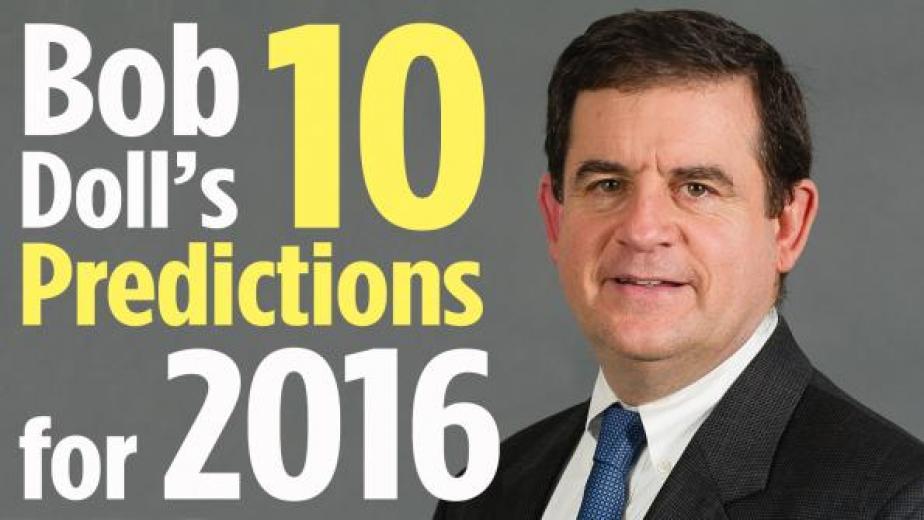1 11
1 11
2015 was characterized by negative earnings surprises, a strong dollar, weak oil, and a bizarre political cycle, among other things. Will 2016 be more of the same?
Bob Doll, Nuveen’s senior portfolio manager and chief equity strategist, provides his top 10 predictions for the year.
Overall, Doll believes it’ll be a “muddle-through” kind of year.
“There are going to be good weeks and bad weeks—both for economic growth, for earnings, and therefore for the performance of the stock market,” he said during a media briefing in New York on Thursday. “There aren’t a lot of table pounders, in terms of trying to find reasons we’re going to have a big up or, I would argue, a big down market either.”
And especially in light of today’s news, China will be one wild card to watch this year. Chinese stocks were down 7 percent Thursday, prompting a halt in trading after just 29 minutes.
“I think what’s exacerbated it all are more technical issues related to the market. For example, a market that’s down 7 percent and closes punishes liquidity and results in lower prices, not higher prices,” Doll said. “I believe if the market had stayed open in China today, that probably the market would be down less than 7 percent, rather than 7. When people don’t have liquidity, you know what they do? They head for the hills as quickly as they can.”
We can expect some contagion from the country’s markets.
“As long as China is falling, do not expect equities anywhere to move up,” he said.
Doll expects U.S. real GDP to stay below 3 percent and nominal GDP to stay below 5 percent for the 10th year in a row. GDP growth will be around 2.5 percent, he said, while inflation will pick up from 1.1 percent to 1.8 percent. Austerity is ending, providing some reason for growth, and the consumer is leading the way.
“The U.S. consumer is the bastion of strength in the world as we speak,” Doll said.
Consumers are benefiting from job growth, the beginning of wage growth, and cleaner balance sheets, which will drive GDP.
Interest rates reached a trough in July 2012, and have slowly risen since. Doll expects that to continue, as labor markets tighten, unemployment likely to fall below 5 percent, and rental rates increase.
Doll forecasts a 10-year Treasury yield at 2.75 percent for the year, causing a 1.52 percent decline in total returns.
High yield spreads should come down, absent a recession, he says. Current spreads are at 602 basis points, compared to 581 basis points for the 18-year average. But default rates are at about half the average now.
“If I can get double the spread and only half the default rate, I think that’s an intriguing combination," he said.
“The biggest challenge for the U.S. stock market in 2015 was negative earnings revisions on the back of declining oil and rising dollar,” Doll said.
He expects that to continue into 2016.
Current consensus estimates have earnings growth at 9 percent and 12 percent for 2016 and 2017, respectively. But Doll believes that’s wishful thinking. He forecasts earnings growth of 5 percent this year and earnings per share of $124, compared to the consensus of $128.
“If we have more weeks like this, i.e. higher dollar, lower oil, we will have flattish earnings one more time,” he said.
Stocks have a recent history of outperforming bonds, and Doll expects that to continue.
Historically, stocks have been up an average of 5 percent in the first 12 months after the first Federal funds rate increase, Doll said. And 10-year Treasuries have been up 92 basis points on average during those periods.
Doll expects non-U.S. equities and non-U.S. bonds to outperform domestic markets. U.S. markets have outperformed non-U.S. stocks and bonds for six years in a row because of anxiety about growth overseas, the rise in the dollar, and the collapse in commodity prices.
But Doll said the U.S. may underperform going forward because of improving global growth, trade improvement, commodity price stabilization and diminished deflation risk. The slowing of the U.S. dollar’s momentum, and an upturn in global profits may also benefit non-U.S. markets.
Nuveen is overweight mid-cycle cyclicals, companies with strong free cash flow, and energy users. They also prefer large-cap over small-cap and growth over value.
Terrorism is in a bull market, Doll said. We’re seeing a proliferation of sophisticated weapons, the collapse of surveillance capabilities, and American geopolitical disengagement.
Yet, these things have little impact on the markets. When a terrorism event strikes, the markets tend to have a bump or two and then move on, Doll said.
Doll believes the federal budget deficit will rise in dollars and as a percentage of GDP for the first time in seven years. He estimates 2016 deficit to rise to $560 billion and 3 percent of GDP, compared to $439 billion and 2.4 percent of GDP in 2015.
“The silver lining for this one is when the government deficit is falling, the government is a drag on the economic growth. When it is spending more money, it adds at least in the short term to GDP.”
Doll expects the Republican party to retain control of Congress and to take the presidency. It will be difficult for the Democrats to win the election after just holding the White House. There’s only been one instance since presidents FDR and Truman when a political party has held the presidency for more than two terms. (That was presidents Ronald Reagan and George H.W. Bush.)

